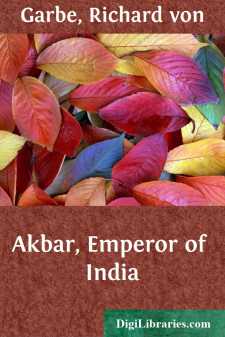Categories
- Antiques & Collectibles 13
- Architecture 36
- Art 48
- Bibles 22
- Biography & Autobiography 813
- Body, Mind & Spirit 142
- Business & Economics 28
- Children's Books 15
- Children's Fiction 12
- Computers 4
- Cooking 94
- Crafts & Hobbies 4
- Drama 346
- Education 46
- Family & Relationships 57
- Fiction 11828
- Games 19
- Gardening 17
- Health & Fitness 34
- History 1377
- House & Home 1
- Humor 147
- Juvenile Fiction 1873
- Juvenile Nonfiction 202
- Language Arts & Disciplines 88
- Law 16
- Literary Collections 686
- Literary Criticism 179
- Mathematics 13
- Medical 41
- Music 40
- Nature 179
- Non-Classifiable 1768
- Performing Arts 7
- Periodicals 1453
- Philosophy 64
- Photography 2
- Poetry 896
- Political Science 203
- Psychology 42
- Reference 154
- Religion 513
- Science 126
- Self-Help 84
- Social Science 81
- Sports & Recreation 34
- Study Aids 3
- Technology & Engineering 59
- Transportation 23
- Travel 463
- True Crime 29
Akbar, Emperor of India
Categories:
Description:
Excerpt
AKBAR, EMPEROR OF INDIA.
The student of India who would at the same time be an historian, discovers to his sorrow that the land of his researches is lamentably poor in historical sources. And if within the realm of historical investigation, a more seductive charm lies for him in the analysis of great personalities than in ascertaining the course of historical development, then verily may he look about in vain for such personalities in the antiquity and middle ages of India. Not that the princely thrones were wanting in great men in ancient India, for we find abundant traces of them in Hindu folk-lore and poetry, but these sources do not extend to establishing the realistic element in details and furnishing life-like portraits of the men themselves. That the Hindu has ever been but little interested in historical matters is a generally recognized fact. Religious and philosophical speculations, dreams of other worlds, of previous and future existences, have claimed the attention of thoughtful minds to a much greater degree than has historical reality.
The misty myth-woven veil which hangs over persons and events of earlier times, vanishes at the beginning of the modern era which in India starts with the Mohammedan conquest, for henceforth the history of India is written by foreigners. Now we meet with men who take a decisive part in the fate of India, and they appear as sharply outlined, even though generally unpleasing, personalities.
Islam has justly been characterized as the caricature of a religion. Fanaticism and fatalism are two conspicuously irreligious emotions, and it is exactly these two emotions, which Islam understands how to arouse in savage peoples, to which it owes the part it has played in the history of the world, and the almost unprecedented success of its diffusion in Asia, Africa and Europe.
About 1000 A.D. India was invaded by the Sultan Mahmud of Ghasna. "With Mahmud's expedition into India begins one of the most horrible periods of the history of Hindustan. One monarch dethrones another, no dynasty continues in power, every accession to the throne is accompanied by the murder of kinsmen, plundering of cities, devastation of the lowlands and the slaughter of thousands of men, women and children of the predecessor's adherents; for five centuries northwest and northern India literally reeked with the blood of multitudes." Mohammedan dynasties of Afghan, Turkish and Mongolian origin follow that of Ghasna. This entire period is filled with an almost boundless series of battles, intrigues, imbroglios and political revolutions; nearly all events had the one characteristic in common, that they took place amid murder, pillage and fire.
AKBAR, EMPEROR OF INDIA.
From Noer's Kaiser Akbar, (Frontispiece to Vol. II).
The most frightful spectacle throughout these reeking centuries is the terrible Mongolian prince Timur, a successor of Genghis-Khan, who fell upon India with his band of assassins in the year 1398 and before his entry into Delhi the capital, in which he was proclaimed Emperor of India, caused the hundred thousand prisoners whom he had captured in his previous battles in the Punjab, to be slaughtered in one single day, because it was too inconvenient to drag them around with him....


